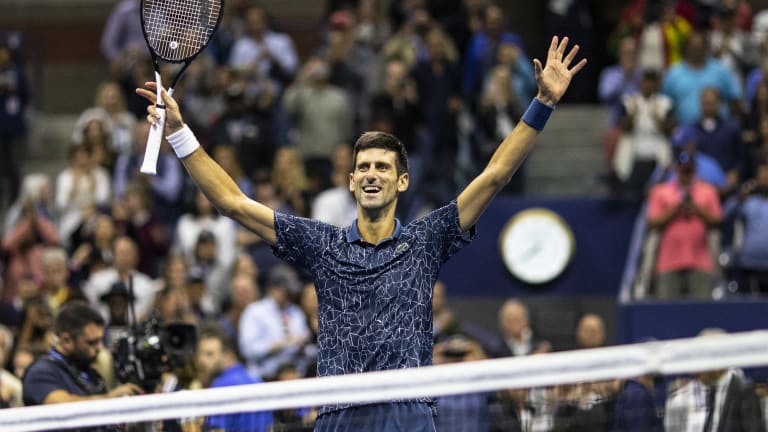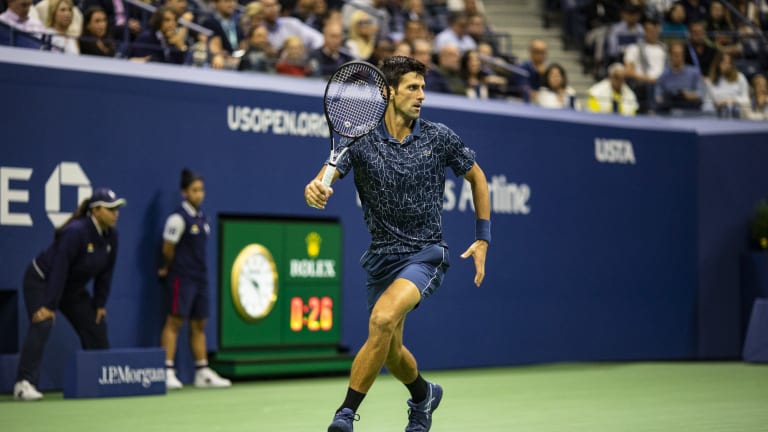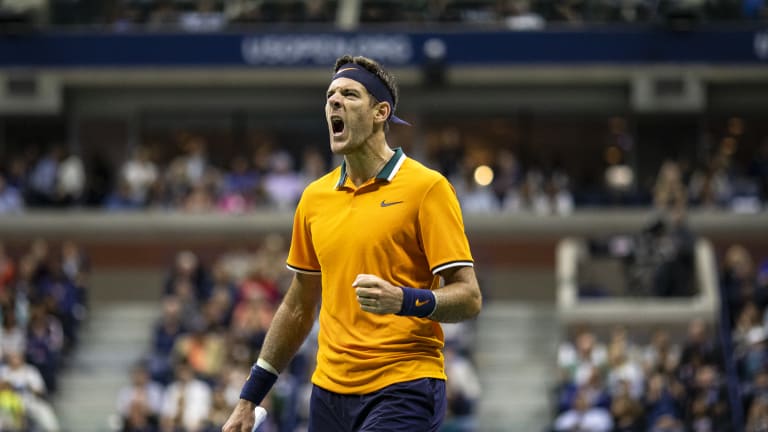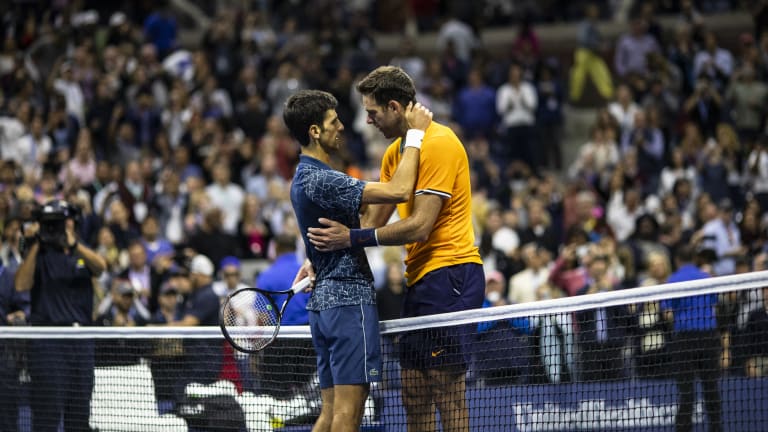Highlights: Novak Djokovic defeats Juan Martin del Potro in US Open final
Novak Djokovic's third US Open triumph may be his most fulfilling
By Steve Flink Sep 10, 2018Wimbledon
Debating best-of-three sets vs. best-of-five
By Steve Tignor May 21, 2021Wimbledon
The Tennis Conversation: Tim Henman
By Matt Fitzgerald May 21, 2021The Pick: Lorenzo Musetti vs. Sebastian Korda, ATP Lyon second round
By Cale Hammond May 18, 2021In Geneva, Roger Federer loses clay-court comeback to Pablo Andujar
By John Berkok May 18, 2021The Pick: Jannik Sinner vs. Aslan Karatsev, ATP Lyon first round
By Cale Hammond May 17, 2021Officials deny that 2022 Australian Open could move
By Kamakshi Tandon May 17, 2021Week in Preview: Serena, Federer lead stars tuning up for French Open
By Steve Tignor May 17, 2021Nadal finds the final answer for Djokovic in roller coaster Rome final
By Steve Tignor May 16, 2021Rafael Nadal battles past Novak Djokovic to win Rome for 10th time
By John Berkok May 16, 2021Novak Djokovic's third US Open triumph may be his most fulfilling
novak djokovic juan martin del potro us open final
Published Sep 10, 2018
Advertising
NEW YORK—In a chance meeting on Saturday morning, I ran into 1988 US Open champion Mats Wilander, an affable fellow with an agile mind and an inner view of the game that few can match.I asked Wilander how he envisioned the final between Novak Djokovic and Juan Martin Del Potro. His response was clear and unequivocal. He said, “I think right now Novak is just a little too good for everyone else.”
I thought of that comment as Djokovic cut down the towering Del Potro with clinical efficiency and immense resolve, 6-3, 7-6 (4), 6-3, to secure his third US Open crown and his 14th title at the majors—thus moving into a tie with the magnificent Pete Sampras in the latter category. Djokovic was masterful in his entire approach to the match. He was far too good for the Argentine in their backhand to backhand exchanges, and that was one of the keys to his victory.
But Djokovic was determined to demonstrate from early on that he was unafraid of the renowned Del Potro forehand, one of the most explosive shots in the modern tennis. Time and again, he challenged the 2009 US Open champion when they went forehand to forehand. In the process, Djokovic neutralized Del Potro and took away his legs. In particular, Djokovic harmed Del Potro with superb running forehands crosscourt, pulling the big man out wide, drawing errors with impeccable placement and impressive pace.
To a very large degree, Djokovic played this final on his terms, never allowing his adversary to establish an easy rhythm, refusing to let Del Potro set up and unleash too many thunderous forehands for outright winners, setting the tempo with uncanny ball control and tactical acumen. To be sure, Djokovic had to work hard over the course of the battle. Only 14 percent of his serves were unreturned by an opponent with a very long wing span. But Djokovic hurt Del Potro irreversibly with his wide slice serve in the deuce court, opening up avenues to keep the Argentine on the run, probing on every point, punishing a fatigued opponent ceaselessly with a polished display on the slow hard court under the roof in Arthur Ashe Stadium.
Advertising

Novak Djokovic's third US Open triumph may be his most fulfilling
© Anita T Aguilar
Photos by Anita Aguilar
Until 3-3 in the first set, neither player had the upper hand. Del Potro had taken 12 of 14 points on serve while Djokovic had won 13 of 19. The No. 6 seed from Serbia had not yet found a way to threaten Del Potro with his outstanding return game. But the set was permanently altered in the next couple of games. A more confident and free swinging Djokovic held at love for 4-3 with back to back forehand swing volleys winners off hanging returns from Del Potro. The No. 3 seed from Argentina proceeded to open up a 40-0 lead with an ace out wide in the eighth game, and was seemingly on his way to a comfortable hold for 4-4.
Yet that did not happen. Djokovic provoked a forehand error from Del Potro to make it 40-15. Then the game’s greatest returner blocked back a forehand return off a 131 M.P.H. first serve from Del Potro, who miss-hit a forehand long: 40-30. Djokovic snapped a running forehand crosscourt to draw a netted forehand on the run from a beleaguered Del Potro: deuce. Now Del Potro missed another forehand on the stretch to fall behind break point as the depth and direction of the Djokovic forehand was unanswerable.
And so, suddenly and unexpectedly, Del Potro was in a bind he could not have anticipated, down break point. This critical exchange lasted 22 strokes, starting with a 130 M.P.H. first serve wide to the Djokovic backhand that the Serbian somehow managed to get back with interest. But on the 23rd stroke, compromised by another stinging Djokovic forehand, Del Potro missed.
With a timely break featuring a remarkable sequence of five consecutive points from 40-0 down, Djokovic had carved out a 5-3 lead. Serving for the set, a high backhand volley winner took him to 30-15 before he erred off the backhand to make it 30-30. A beautifully placed first serve out wide at 104 M.P.H. lifted Djokovic to 40-30 as the Argentine drove a return long. He sealed the set by outperforming Del Potro on the 18th shot of an extended rally.
Advertising

Novak Djokovic's third US Open triumph may be his most fulfilling
© Anita T Aguilar
Djokovic had elevated his game significantly across the last three games of the first set, and his mastery continued in the early stages of the second. Del Potro had managed to save a couple of break points in the opening game, but Djokovic broke through skillfully in the third game and held for 3-1. He had won six of seven games during this sterling stretch, and the 2011 and 2015 champion seemed fully capable of pulling away inexorably and marching to a straight-set victory.
Del Potro wanted no part of that scenario. He held on at 30 in the fifth game and broke Djokovic for 3-3 in a deuce game, profiting from a pair of unforced errors to gain that boost.
Buoyant about this surprising turnaround, Del Potro went to 30-0 in the following game with a forehand winner and an ace out wide at 125 M.P.H. to finish off a love game. Del Potro had won three straight games. His unrelentingly vocal supporters in the audience were chanting. The entire stadium was as highly charged as it would be at any stage of the match.
It was strikingly apparent that when Djokovic served at 3-4, the chips would be on the line and the Argentine would be pursuing another service break at full force. This pivotal eighth game of the second set would go to deuce eight times. The tension throughout was palpable. The two players recognized the magnitude of this moment. They understood exactly what as at stake.
For Djokovic, the trouble started at 40-30 when he used a drop shot to set up a backhand volley—only to miss the volley flagrantly. Del Potro would then lace a two-hander down the line for a winner to earn a break point, but a heavy Djokovic forehand to the Delpo backhand drew an error. And so it went. Altogether in that game, Djokovic had five game points and Del Potro three break points before the Serbian took this marathon game by cagily angling a forehand crosscourt to force an errant down-the-line forehand from Del Potro.
At various stages in that game on his way back to 4-4, Djokovic was imploring the crowd to cheer him on, looking for their approval, hoping they would respond to his earnest appeals. Large pockets of the audience were roaring for Del Potro, and Djokovic surely had memories of defeating Roger Federer in the 2015 final with 99 percent of the crowd seemingly rooting for his revered opponent.
Advertising

Novak Djokovic's third US Open triumph may be his most fulfilling
© Anita T Aguilar
In any case, both players held comfortably from 4-4 into the tie-break. Del Potro conceded only three points in his two service games while Djokovic gave up only one. The stage was set for a tie-break that was imperative for both players. The second set would last for no less than 95 minutes, leaving both players drained. But losing it after throwing everything they had physically and emotionally into succeeding was going to be a devastatingly potent blow for either man.
After Djokovic established an immediate mini-break, Del Potro won the next three points for a 3-1 lead. He had Djokovic playing defense, and the Serbian rolled a forehand down the middle. Del Potro went for the winner but netted a shot that might have been slightly more difficult than it looked.
Now Djokovic was serving at 2-3. He attacked behind a terrific forehand approach, easily putting away an overhead for 3-3. Then Djokovic came in again off the forehand on a delayed approach, and Del Potro was caught off guard, slicing his backhand pass wide down the line. Make it 4-3 for Djokovic. Having lost three points in a row, Del Potro needed the next one badly.
He did manage to get it, reaching 4-4 on an unprovoked backhand error from Djokovic. But Djokovic sent a soft return deep down the middle, and Del Potro took the bait, driving a forehand into the net. Djokovic had turned the corner for good. Serving at 5-4, he was outstanding. He played that point with utter control and purpose, outmaneuvering his rival masterfully until, after 17 strokes, Del Potro misfired on an inside-out forehand that was not in the cards. At 6-4, Djokovic was every bit as impressive, hitting a forehand crosscourt at a sharp angle, inviting Del Potro to drive a forehand into the net.
This was an under-appreciated clutch effort from Djokovic as he closed out the tie-break by capturing six of the last seven points. The 31-year-old was now ahead two sets to love, and Del Potro knew full well that sweeping three sets consecutively from that juncture was going to be next to impossible. When Djokovic broke for a 3-1 lead in the third set, he looked decidedly fresher, but Del Potro kept competing with the same depth of determination. Djokovic had two game points for 4-1, but did not convert, missing a routine two-hander crosscourt, and getting beaten by a low return when he tried to serve-and-volley on the other.
It was not quite over after all. Del Potro climbed back to 3-3 and even had 15-30 with Djokovic serving in the seventh game, but enough was enough. Djokovic was unflustered, holding on for 4-3 on a run of three points in a row, breaking at 15 for 5-3, and closing out the match with a hold at 30, fittingly putting away an overhead to finish it all off.
Advertising

Novak Djokovic's third US Open triumph may be his most fulfilling
© Anita T Aguilar
For the third time in his career, Djokovic has swept the Wimbledon-US Open double, realizing this remarkable feat as he had already done in 2011 and 2015. He will surely move past Sampras on the all-time list of men’s singles victors at the majors at some point soon enough, and perhaps close the gap between himself and Rafael Nadal (who holds 17 Grand Slam tournament titles) for second place. He might one day even surpass the Spaniard.
Djokovic is now clearly the best player in the world, even if the ATP Rankings do not yet officially reflect it. He is in second place behind Nadal in the ATP Race to London, and he will almost surely finish 2018 atop the rankings.
Asked about his stunning reversal of fortunes after missing the second half of last year and performing beneath his normal standards this year both before and after elbow surgery, he said, “If you told me in February this year when I got the surgery that I’ll win Wimbledon, US Open and Cincinnati, it would be hard to believe. But at the same part there was always a part of me that always imagined and believed and hoped that I can come back to the desired level of tennis very soon. I expected, to be honest and quite frank, that after surgery I’ll be back on a high level quite fast. But, you know, it actually took me three or four months really.
“In that process, I learned a lot about myself, learned to be patient, which was never really a stronger side of me. But at the same time, life taught me that it takes time for good things, it takes time to really build them, for things to fall into place so you can center yourself, balance yourself and thrive. The last two months have been terrific.”
WATCH—An interview with the champion, Novak Djokovic:
The next few months and beyond could well be much the same. I expect Djokovic to finish this year strong, and head confidently into 2019. After those two previous years when he won Wimbledon and the US Open in 2011 and 2015, Djokovic moved on to Melbourne and was victorious there. I believe that is likely to happen again when he goes back to Australia at the start of 2019. He is playing some of the best tennis of his career, and the feeling grows that he will sustain his excellence for some time to come.
Djokovic is a champion of the highest order, and maybe now, after all he has endured, after a spectacular comeback in 2018, he will finally get the recognition he deserves for who he is and what he has done in one of the great eras ever in the world of tennis.